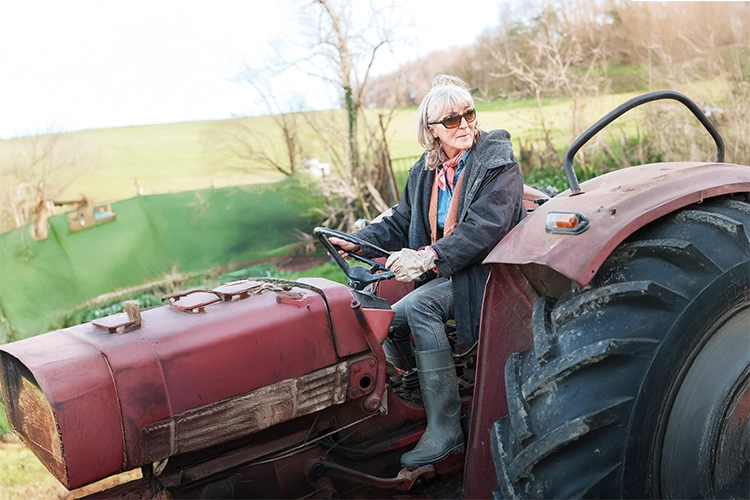


From Scottish tractors to Senegalese rice fields, Andrew Brooks traces how outdated labels still frame women’s work and men’s status across global landscapes
Recently, the National Farmers Union of Scotland (NFUS) urged its members to stop using phrases such as ‘farmer’s wife’ to address women in agriculture. Such gendered language reinforces stereotypes, but for today’s NFUS, a ‘farmer’ isn’t a man. It can be a man or a woman. Therefore, the union leaders need to be careful and deliberate in their use of terminology and not reproduce the stereotypes of females in the agricultural sector as appendages to men. To consider it geographically, we can think about farm spaces as typically being gendered: tractor sheds, ploughed fields and the rugged hills and valleys characteristic of Scottish agricultural landscapes are masculine spaces, whereas farm kitchens, milking parlours and meadows are feminised. This is deeply problematic, as many Scottish women are well able to hitch up a John Deere and plough a hillside.
As well as being a trope that perpetuates stereotypes and can curtail access to employment in modern agri-businesses, the label ‘farmer’s wife’ is inappropriate and inaccurate in very different socio-economic contexts to rural Scotland. Across much of the Global South, most farm labour is undertaken by women rather than men. In my own research in sub-Saharan Africa, I’ve seen firsthand how female, and sometimes child, labour predominates in the fields of Malawi and Zambia. Elsewhere, in West Africa, crops are gender-specific. In Senegal, cotton and sorghum are mainly cultivated by men, whereas peanuts and rice are mostly grown by women. Bassari people, who live primarily in Senegal, have different male and female spheres of agricultural labour. Men often dominate in producing cash crops and women grow the staples that feed the family, although these differences break down during moments of the crop cycle when there’s a need for more woman- or man-power. It would be no more appropriate to call a Senegalese man a ‘rice farmer’s husband’ than it would be to use the term ‘farmer’s wife’ in Scotland.
A world away from agriculture, in the field of international diplomacy, men dominate the top jobs. Globally, only around 20 per cent of ambassadors are women, a figure that has barely risen in the last decade. As with Scottish farms, there is a perception of certain diplomatic spaces as being gendered. The embassy and foreign ministries are male spaces, whereas garden parties and residencies are more feminised. Diplomacy is an unusually demanding career requiring relocation every three to five years, well into mid-career, which creates challenges for women, who are still considered primary caregivers, and makes it a job that doesn’t fit well with family life. That said, historically, the work of a top male diplomat depended on unpaid forms of female labour. Half a century ago, it was a wife’s responsibility to reproduce Her Majesty’s diplomatic residency as a stereotypical upper-class British home: to make the space a little corner of the mother country on foreign soil and supervise the local staff who cooked roast beef for Sunday lunch. Women were even instructed on how to celebrate the Queen’s birthday before being dispatched in their husband’s wake. Even now, during ambassadorial parties, there are moments when wives are all found in a separate room away from the real decision-making.
Read more articles from Andrew Brooks…
Outside of bilateral missions, in international organisations such as the UN, female representation is much higher in agencies such as UNICEF, where women hold more than 50 per cent of the top jobs. Here, mentoring, commitment to equity, diversity and inclusion, and support for careers may be superior to that offered by some national governments, helping close the gender gap. When I lived in a southern African country, I was friends with a German married to a senior diplomat. He struggled to find a role for himself, and his major preoccupations were plotting motorbike trips across the continent and trying to import Diet Pepsi for his wife. Having been a successful businessman back home, he now faced the new challenge of being a trailing partner, familiar to generations of ambassadors’ wives.
Welcome changes in employment and representation are slowly happening in places as disparate as Scottish farming villages and African diplomatic circles. Human geographers have a role to play in uncovering the social and cultural stories of different places, but also in advocating for marginalised voices. This can mean going further than the NFUS and the UN in promoting equality. We shouldn’t only move away from heteronormative world views that promote an uneven husband-and-wife relationship as the normal and preferred way of living, but embrace how any line of work, from farmers to diplomats, should be open to everyone.




